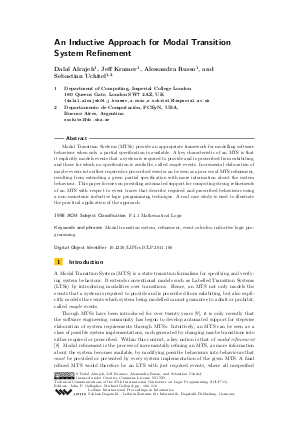An Inductive Approach for Modal Transition System Refinement
Authors Dalal Alrajeh, Jeff Kramer, Alessandra Russo, Sebastian Uchitel
-
Part of:
Volume:
Technical Communications of the 27th International Conference on Logic Programming (ICLP'11) (ICLP 2011)
Part of: Series: Leibniz International Proceedings in Informatics (LIPIcs)
Part of: Conference: International Conference on Logic Programming (ICLP) - License:
 Creative Commons Attribution-NonCommercial-NoDerivs 3.0 Unported license
Creative Commons Attribution-NonCommercial-NoDerivs 3.0 Unported license
- Publication Date: 2011-06-27
File

PDF
LIPIcs.ICLP.2011.106.pdf
- Filesize: 0.55 MB
- 11 pages
Document Identifiers
Subject Classification
Keywords
- Modal Transition Systems
- Refinement
- Inductive Logic Programming
- Event Calculus
Metrics
- Access Statistics
-
Total Accesses (updated on a weekly basis)
0PDF Downloads0Metadata Views
Abstract
Modal Transition Systems (MTSs) provide an appropriate framework for modelling software behaviour when only a partial specification is available. A key characteristic of an MTS is that it explicitly models events that a system is required to provide and is proscribed from exhibiting, and those for which no specification is available, called maybe events. Incremental elaboration of maybe events into either required or proscribed events can be seen as a process of MTS refinement, resulting from extending a given partial specification with more information about the system behaviour. This paper focuses on providing automated support for computing strong refinements of an MTS with respect to event traces that describe required and proscribed behaviours using a non-monotonic inductive logic programming technique. A real case study is used to illustrate the practical application of the approach.
Cite As Get BibTex
Dalal Alrajeh, Jeff Kramer, Alessandra Russo, and Sebastian Uchitel. An Inductive Approach for Modal Transition System Refinement. In Technical Communications of the 27th International Conference on Logic Programming (ICLP'11). Leibniz International Proceedings in Informatics (LIPIcs), Volume 11, pp. 106-116, Schloss Dagstuhl – Leibniz-Zentrum für Informatik (2011)
https://doi.org/10.4230/LIPIcs.ICLP.2011.106
BibTex
@InProceedings{alrajeh_et_al:LIPIcs.ICLP.2011.106,
author = {Alrajeh, Dalal and Kramer, Jeff and Russo, Alessandra and Uchitel, Sebastian},
title = {{An Inductive Approach for Modal Transition System Refinement}},
booktitle = {Technical Communications of the 27th International Conference on Logic Programming (ICLP'11)},
pages = {106--116},
series = {Leibniz International Proceedings in Informatics (LIPIcs)},
ISBN = {978-3-939897-31-6},
ISSN = {1868-8969},
year = {2011},
volume = {11},
editor = {Gallagher, John P. and Gelfond, Michael},
publisher = {Schloss Dagstuhl -- Leibniz-Zentrum f{\"u}r Informatik},
address = {Dagstuhl, Germany},
URL = {https://drops.dagstuhl.de/entities/document/10.4230/LIPIcs.ICLP.2011.106},
URN = {urn:nbn:de:0030-drops-31758},
doi = {10.4230/LIPIcs.ICLP.2011.106},
annote = {Keywords: Modal Transition Systems, Refinement, Inductive Logic Programming, Event Calculus}
}
